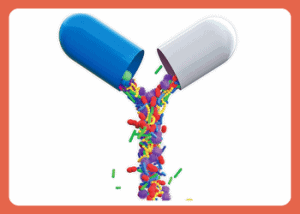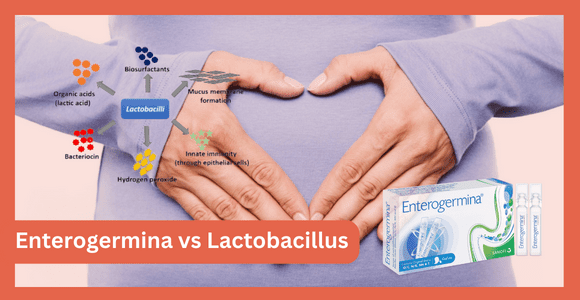To maintain optimal physical and mental health, it’s essential to ensure the well-being of your gut. After all, this is where digestion takes place, nutrients are absorbed, and immunity is regulated! Increasingly popular probiotics such as Enterogermina and Lactobacillus may help support such a goal by restoring balance in your digestive system.
In this article, we will thoroughly compare Enterogermina and Lactobacillus – two popular probiotics. By analyzing the advantages, distinctions, and possible side effects of these probiotics in detail, readers will be able to make an informed decision on which one is most appropriate for their personal requirements.
In this article, we’ll take a closer look, comparing their efficacy in promoting digestive health and treating diarrheal symptoms.
We will evaluate both the similarities and disparities between them to better understand how they influence gut microbiota and if there are potential interactions with medications.
Table of Contents
Enterogermina: What is it and How Does it Work?
Sanofi-Aventis’ Enterogermina is an acclaimed probiotic supplement that assists with digestive health. This product can be purchased in a variety of countries and is renowned for its key ingredient – the Bacillus clausii bacteria strain.
 Studies have confirmed it promotes beneficial changes within the digestive system, making it a wise choice for those seeking to improve their overall well-being.
Studies have confirmed it promotes beneficial changes within the digestive system, making it a wise choice for those seeking to improve their overall well-being.
The most important component of Enterogermina is Bacillus clausii, a spore-forming bacterium with the unique ability to withstand various environmental elements like heat and acidity.
This capacity allows the bacteria to make it through the harsh environment of digestion and arrive in your intestines where they can perform their positive benefits.
Enterogermina is a powerful solution that encourages the growth and activity of good bacteria while suppressing bad bacteria. Is enterogermina a probiotic? Of course yes.
It uses Bacillus clausii to generate antimicrobial compounds that prohibit the development of viruses like Escherichia coli, Salmonella, and Clostridium difficile. Furthermore, it stimulates antibody production within your gut which serves as an additional layer of protection against any kind of infection.
| Potential Benefits | Potential Side Effects |
|---|---|
| Improving digestion | Nausea |
| Reducing diarrhea and constipation symptoms | Vomiting |
| Enhancing immune function | Abdominal pain |
| Preventing or treating infections caused by harmful bacteria | Allergic reactions |
Depending on age and health status, the suggested dosage is anywhere from one to two vials per day – best taken before meals.
To ingest, simply mix with water or any other non-alcoholic beverage, then drink immediately. The duration of intake may range from a couple of days up to what your healthcare professional advises.
Unlike other probiotic supplements, Enterogermina stands out due to its specific strain of bacteria that is resilient against numerous environmental factors.
This robustness guarantees the microbial’s survival in the digestive system and it has been proven through extensive clinical trials which have affirmed its efficacy in keeping digestion healthy and protecting from harmful bacterial infections.
Lactobacillus: What is it and How Does it Work?
Lactobacillus is a probiotic bacteria that provides immense health benefits by restoring the balance of beneficial microorganisms in one’s gut.
 This type of bacteria can be found scattered all over our bodies, from the mouth to the urinary tract and female reproductive system.
This type of bacteria can be found scattered all over our bodies, from the mouth to the urinary tract and female reproductive system.
There are multiple species with unique characteristics – each offering its own distinct advantages.
A variety of lactobacillus strains exist, each with its own special activities and associated health advantages.
For instance, Lactobacillus acidophilus aids in diminishing the symptoms of lactose intolerance and preventing vaginal infections; meanwhile, scientific studies have demonstrated that consuming Lactobacillus rhamnosus can boost immune function as well as diminish the probability of developing respiratory issues.
Lactobacillus plays a crucial role in protecting your body from harmful bacteria by colonizing the gut and other areas of the body.
This friendly microorganism also produces lactic acid, which helps lower the pH level of our digestive system, making it an inhospitable environment for bad bacteria. Moreover, lactobacillus enzymes break down food more efficiently to optimize nutrient absorption and aid better digestion.
Lactobacillus supplementation is dependent upon the particular strain and must be tailored according to the individual’s age and health.
| Potential Benefits | Potential Side Effects |
|---|---|
| Improving digestion | Gas |
| Reducing symptoms of lactose intolerance and irritable bowel syndrome | Bloating |
| Enhancing immune function | Diarrhea |
| Preventing and treating vaginal and urinary tract infections | Allergic reactions |
| Improving skin health |
Usually, taking between 1-10 billion colony-forming units per day has been recommended; but make sure to follow your healthcare provider’s instructions for personalized dosing recommendations. These supplements can be taken with or without food -basically whatever works best for you.
What is the Difference Between Them?
The major distinction between Lactobacillus and Bacillus clausii is that the former does not create spores, while the latter does. Both of these probiotic germs are known to confer certain well-being benefits when consumed as part of a healthful diet.
 The resilient Bacillus Clausii bacterium, which can survive even in an acidic stomach environment, is revered for its capacity to colonize and outcompete damaging bacteria.
The resilient Bacillus Clausii bacterium, which can survive even in an acidic stomach environment, is revered for its capacity to colonize and outcompete damaging bacteria.
In clinical studies, it has been demonstrated that taking Bacillus Clausii supplements leads to remarkable improvement of diarrhea symptoms as well as inflammatory bowel disease and antibiotic-associated diarrhea issues.
In contrast, the Lactobacillus bacteria are a collection of non-spore-forming microorganisms that can often be located in the gut and other regions of our bodies.
These remarkable cells have the capacity to generate lactic acid which reduces the pH level of our intestines; making them unappealing to hazardous germs. Studies have shown that having adequate amounts of these friendly bacteria may improve digestion, bolster immunity, as well as mitigate threats from certain infections.
What are the Similarities Between Them?
- Lactobacillus and Bacillus Clausii are probiotics.
- Both classify under the class
- They are both gram-positive, rod-shaped, and motile bacteria.
- These bacteria can form mutualistic relationships with the human host.
- Both are considered helpful to humans.
- They produce proteases and survive in harsh acidic environments.
Antibiotic vs Probiotic vs Prebiotic
Antibiotics, probiotics, and prebiotics are all terms related to the health and function of the microbiome, which refers to the community of microorganisms that live in and on the human body. While these terms may sound similar, they have distinct definitions and roles in promoting health.
Antibiotics are medications used to treat bacterial infections by killing or slowing the growth of harmful bacteria. While antibiotics can be lifesaving, they can also have negative effects on the microbiome.
Antibiotics can kill both harmful and beneficial bacteria, disrupting the balance of the microbiome and increasing the risk of antibiotic-associated diarrhea and other infections. Overuse of antibiotics can also lead to antibiotic resistance, which is a growing concern in healthcare.
 Probiotics, on the other hand, are live microorganisms that can provide health benefits when consumed in adequate amounts.
Probiotics, on the other hand, are live microorganisms that can provide health benefits when consumed in adequate amounts.
Probiotics are often found in fermented foods and supplements, and they work by colonizing the gut and other areas of the body, where they compete with harmful bacteria and help restore the balance of the microbiome.
Probiotics have been shown to improve digestion, enhance immune function, and reduce the risk of certain infections, among other benefits.
Prebiotics are non-digestible fibers that stimulate the growth and activity of beneficial bacteria in the gut. Prebiotics are found in foods such as onions, garlic, bananas, and whole grains. Prebiotics are not live microorganisms like probiotics, but they promote the growth of beneficial bacteria in the gut, which can have positive effects on digestion and overall health.
It is important to note that while antibiotics, probiotics, and prebiotics can all impact the microbiome, they have different mechanisms of action and potential effects on health.
Antibiotics are used to treat bacterial infections but can also have negative effects on the microbiome. Probiotics and prebiotics are used to promote the growth and activity of beneficial bacteria, which can have positive effects on digestion and overall health.
Frequently Asked Questions
Is Enterogermina a Lactobacillus?
Yes, Enterogermina is a probiotic, which contains a bacteria called Bacillus clausii.
Which Lactobacillus is Best for Diarrhea?
Lactobacillus rhamnosus GG(LGG).
What Can be Used Instead of Enterogermina?
- Enbios Suspension. Macleods Pharmaceuticals Pvt. Ltd.
- Entroflora Suspension. Macleods Pharmaceuticals Pvt. Ltd.
- Novogermina Suspension. Alkem Laboratories Ltd.
- Benegut Suspension. Abbott Healthcare Pvt. Ltd.
- Darolac Aqua Suspension. Aristo Pharmaceuticals Pvt. Ltd.
Is Enterogermina Good for Vomiting?
There is limited scientific evidence to support the effectiveness of Enterogermina specifically for vomiting. While it is commonly used to promote digestive health, other treatments may be more effective for treating vomiting depending on the underlying cause.
Conclusion
Ultimately, probiotics have been receiving attention for their capacity to enhance digestive health. While research has indicated that Bacillus Clausii and Lactobacillus can reduce the symptoms of some GI diseases like diarrhea and IBD, there is not enough evidence to suggest they are beneficial in alleviating other issues such as vomiting.
While probiotics are not meant to be a substitute for proper medical care, they might benefit certain individuals if used as part of an approach that promotes overall wellness. That said, it is strongly recommended to speak with your doctor or healthcare provider before beginning any new supplement plan.
